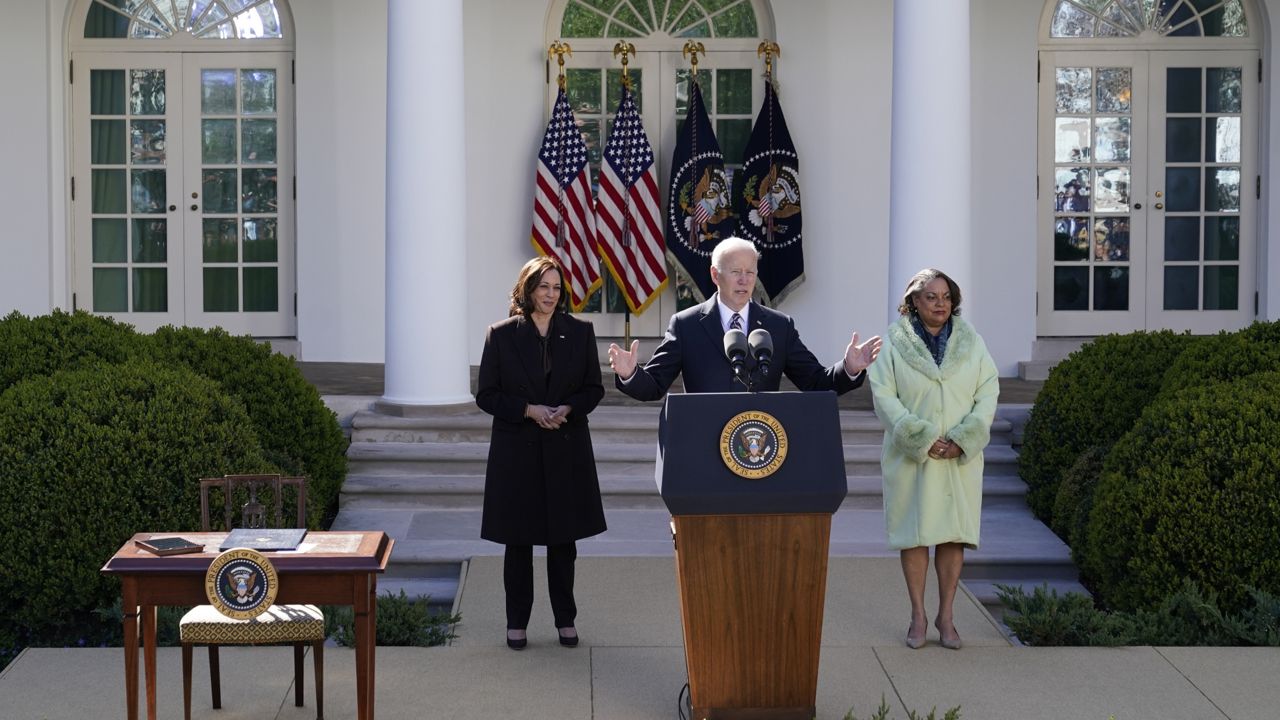President Joe Biden on Tuesday signed H.R. 55 – also known as the Emmett Till Antilynching Act – into law, for the first time making lynching a federal hate crime nearly seven decades after the brutal killing of the bill’s namesake.
“No federal law expressly prohibited lynching, not until today,” Biden said during a ceremony at the Rose Garden, later adding: “Lynching was pure terror. To enforce the lie, that not everyone belongs in America. Not everyone is created equal. To systematically undermine hard, hard fought civil rights.”
The new law makes it possible to prosecute a crime as a lynching when a conspiracy to commit a hate crime leads to death or serious bodily injury. The law lays out a maximum sentence of 30 years in prison and fines.
The House approved the bill 422-3 on March 7, with eight members not voting, after it cleared the Senate by unanimous consent.
Congress first considered anti-lynching legislation more than 120 years ago. It failed to pass such legislation nearly 200 times, beginning with a bill introduced in 1900 by North Carolina Rep. George Henry White, the only Black member of Congress at the time.
The bill is named after the late 14-year-old Emmett Till, who in 1955 was abducted, beaten and brutally killed by two white men, who were subsequently acquitted by an all-white jury in Mississippi. The two men would go on to admit to Till’s murder the following year.
The outcome of the trial, coupled with Till’s mother’s insistence on holding an open-casket, public funeral to show her son’s brutalized body, served as a catalyst and turning point for the civil rights movement, with activists and leaders often evoking his memory.
Martin Luther King, Jr., mentioned Till’s name more than once in his many addresses fighting for equality, and delivered his famous “I Have a Dream” speech on the eighth anniversary of Till’s murder.
Rosa Parks, whose arrest for refusing to give up her seat on an Alabama bus occurred just 100 days after Till’s murder, reportedly “thought about going to the back of the bus [...] then she thought about Emmett Till and she couldn’t do it,” according to Rev. Jesse Jackson.
“To the Till family: We remain in awe of your courage, to find purpose through your pain,” Biden said Tuesday. “But the law is not just about the past. It's about the present and our future as well.”
Biden acknowledged there is still an ongoing fight for equality in the United States, saying in part: “Racial hate isn't an old problem. It's a persistent problem.”
“Hate never goes away. It only hides. It hides under the rocks. Given just a little bit of oxygen, it comes roaring back out, screaming,” he continued. “What stops it? It is all of us, not a few. All of us have to stop it.”
Biden also introduced Michelle Duster, the great-granddaughter of Ida B. Wells, an anti-lynching activist and journalist born in 1862 who brought her fight to President William McKinley’s White House, to speak at Tuesday’s ceremony.
“Since my great-grandmother's visit to the White House 124 years ago, there have been over 200 attempts to get [anti-lynching] legislation enacted,” Duster said in part. “But we finally stand here today, generations later, to witness this historic moment of President Biden signing the Emmett Till anti lynching bill into law. We are here today because of the tenacity of the civil rights leaders and commitment of members of Congress who are here today.”
Biden, after greeting lawmakers following the ceremony, quipped to the audience: "As someone once said: This is a big deal."
The Associated Press contributed to this report.



